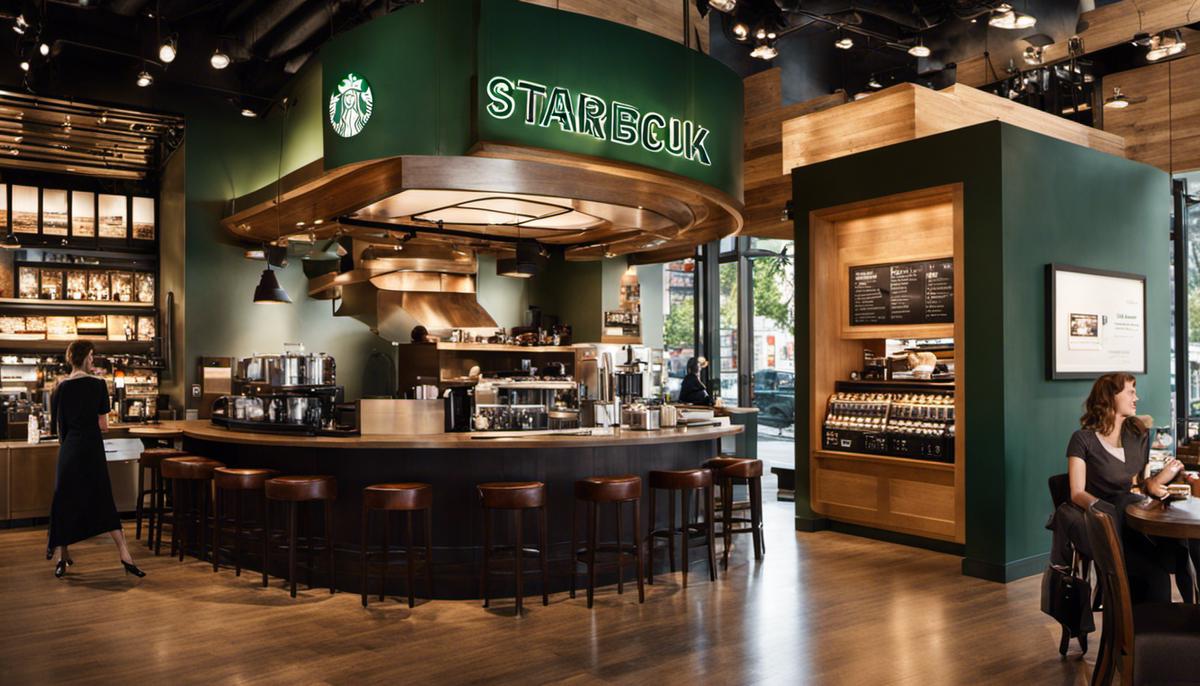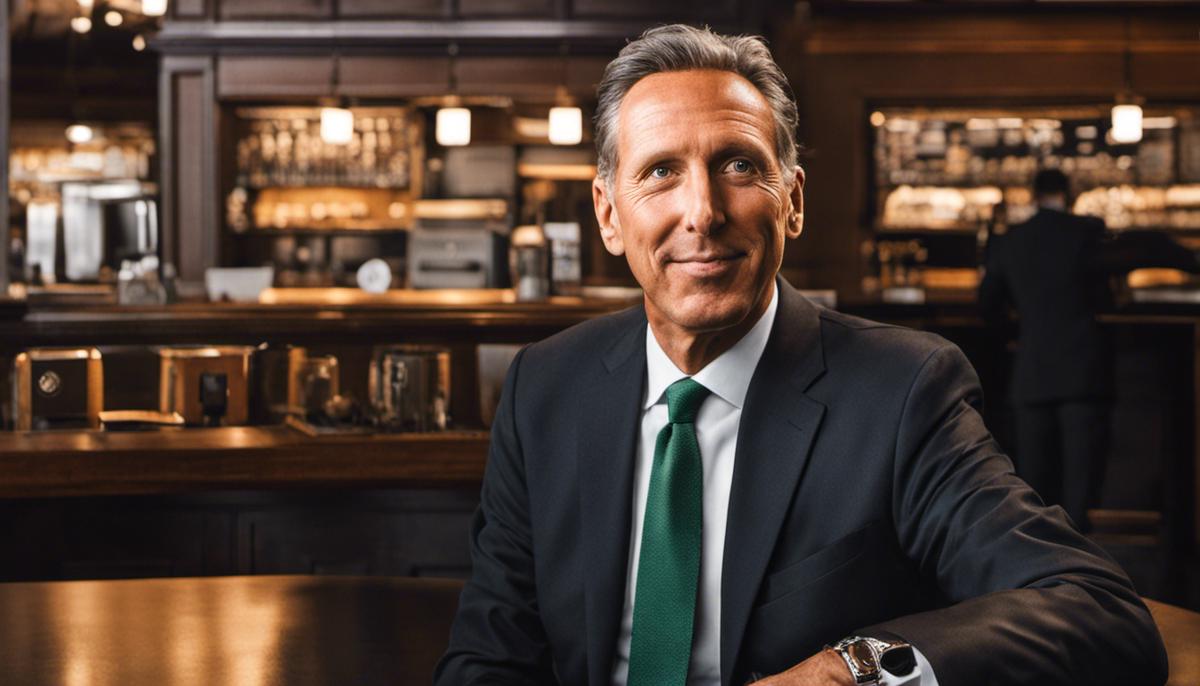Howard Schultz, the indomitable force behind the global success of Starbucks, stands as a pre-eminent example of transformational leadership that transcends conventional business paradigms. Emerging from humble beginnings to ascend the pinnacle of success, Schultz’s developmental journey offers unparalleled insights into the kind of leadership that fosters sustainable growth, ethical business conduct and employee empowerment. This in-depth discussion delves into his career trajectory, leadership style, foundational principles, faced challenges and the profound impact he’s had on Starbucks and the corporate world at large.

Career Journey and Achievements of Howard Schultz
Early Career and Rise of Howard Schultz
Howard Schultz’s humble beginnings are often the catalyst cited for his groundbreaking leadership style. Born to a truck driver father and a receptionist mother in Brooklyn, New York, Schultz’s blue-collar background contrasts sharply with his status as a successful business magnate today. After earning his degree from Northern Michigan University, Schultz held various roles at Xerox Corporation before becoming the general manager for Swedish drip coffee maker manufacturer, Hammarplast.
Schultz’s career pivot occurred when he started working for Starbucks, a Seattle coffee bean store, as the Director of Retail Operations and Marketing in 1981. Starbucks was just a regional player with a little over 60 stores, but Schultz saw massive potential. He recognized the importance of creating communal spaces, inspired by Italian coffee culture, and argued for the shift from selling coffee beans to creating experiential coffee stores.
Implementation of Schultz’s Vision
In 1983, Schultz took a trip to Italy that would revolutionize Starbucks and the global coffee industry. Inspired by Italian espresso bars, he envisioned a place where conversation and sense of community could intertwine with good, quality coffee. This revolutionary idea, however, was initially rejected by Starbucks founders. This setback did not deter Schultz. He left Starbucks and founded Il Giornale, a cafe that successfully implemented his vision of a coffee serving, community-centered gathering space.
In 1987, Schultz acquired Starbucks and officially resurrected it under his leadership. He became CEO and chairman and immediately began expanding stores nationally and internationally, multiplying the store number from 17 to more than 28,000.
Leadership Style and Achievements
Unlike many leaders of his generation, Schultz adopted a people-first leadership style. His focus on employees, whom he refers to as ‘partners’, was a cornerstone of his successful managerial approach. Schultz implemented comprehensive health coverage for all employees (including part-time workers) and later launched the College Achievement Plan, a program providing tuition-free college education through Arizona State University’s online degree program for eligible U.S. partners. This emotionally intelligent approach to personnel management boosted morale and loyalty among Starbucks employees, inflation-proofing the brand during economic downturns.
Under Schultz’s leadership, Starbucks not only expanded globally but also diversified its product range, moving beyond coffee to an array of beverages, food items, and consumer products. Schultz also pioneered digital innovations for Starbucks, introducing the Mobile Order and Pay feature, and the Starbucks Rewards loyalty program.
Contribution to Corporate Social Responsibility
Schultz’s socially conscious leadership also shone through with Starbucks’ commitment to corporate social responsibility. His initiatives include committing to hire 10,000 refugees globally by 2022, pledging to hire 10,000 military veterans and spouses by 2023, and creating opportunities for the youth through the Pathway to Admission program.
In 2014, Forbes listed Schultz as the 35th richest person in the United States, with a net worth of $2 billion. Furthermore, he also left an indelible mark through his authorship, penning books such as “Pour Your Heart into It: How Starbucks Build a Company One Cup at a Time” and “Onward: How Starbucks Fought for Its Life without Losing Its Soul”.
Despite stepping down as CEO in 2017, and later, as Chairman in 2018, Howard Schultz’s powerful legacy still echoes across Starbucks’ success narrative. Today, his influences are deeply interwoven within the company’s values, cultural fabric, operational tactics, which cast him as an influential trailblazer within the context of contemporary corporate leadership.

Leadership Style of Howard Schultz
Exploring the Transformational Leadership of Howard Schultz
Howard Schultz’s style of leadership primarily manifests as transformational, distinguished by his aptitude to enthuse and spur others towards transcending their individual agendas for the larger welfare of the organization. Conceptualizing Schultz’s leadership style channeled through four traits – idealized influence, inspirational motivation, intellectual stimulation, and individualized consideration – presents a comprehensive picture.
When it comes to idealized influence, Schultz sets an exceptional personal bar for integrity and cultivates an atmosphere of mutual trust and respect. His charismatic method of leading motivates employees and crafts a vision that captivates and motivates them, helping foster the unity essential to propel Starbucks to impressive heights.
Inspirational motivation is another prominent facet of Schultz’s management approach. He articulates a captivating vision of the future and drives his employees to pursue it. His talent in compellingly communicating a transparent course and galvanizing enthusiasm has considerably driven Starbucks’ growth and triumph.
Schultz’s Employee-First Policy
One of the cornerstones of Schultz’s leadership style is his ’employee-first’ policy. Believing that employees are the real assets of the company, Howard Schultz refers to them as ‘partners’. He instituted comprehensive healthcare benefits for both full and part-time staff, and developed programs like the College Achievement Plan which covers the tuition fee for a bachelor’s degree for all eligible employees.
A strong believer in the phrase “Treat people like family, and they will be loyal and give their all,” Schultz’s employee-first policy has led to higher employee morale and increased productivity, essentially contributing to the overall success of the company.
Innovation-Driven Pursuits
Schultz is a visionary leader possessing a long-term strategic perspective and is known for his innovative approach. Under his leadership, Starbucks introduced many novel concepts like the Frappuccino and Wi-Fi services in stores, and even expanded on the existing concept of coffeehouses as the ‘third place’. Schultz’s fearless adoption of technology has set the company apart from others in the industry.
Schultz’s Commitment to Corporate Social Responsibility
Howard Schultz’s leadership style is also characterized by his commitment towards corporate social responsibility (CSR). He expanded Starbucks’ CSR efforts to include responsible purchasing practices, community volunteering, and dedicating a portion of sales to help AIDS victims in Africa. Schultz believes in leading a profit-driven organization while also prioritizing ethical practices and social issues.
Howard Schultz’s Long-Term Influence on Starbucks
Howard Schultz’s leadership approach has left an indelible mark on Starbucks’ ethos and operations. His prioritization of employees has encouraged team loyalty and nurtured an enthusiastic work environment, paving the way for increased efficiency. Schultz’s relentless commitment to innovation has been instrumental in carving out Starbucks’ unique brand image and subsequent global success in an intensely competitive market. His focus on corporate social responsibility resonates strongly with customers, cultivating brand loyalty among those who espouse similar ethical standards. As such, Schultz’s leadership has been a cornerstone in building a profitable, socially aware, and esteemed global organization.
Principles and Philosophies of Schultz’s Leadership
Schultz’s Philosophy of Servant Leadership
Howard Schultz, Starbucks’ CEO, is a proponent of servant leadership, a method that challenges the conventional corporate hierarchy by prioritizing service over authority. Schultz emphasizes the idea of leading by serving, advocating that employee welfare, or ‘partners’ in Starbuck’s parlance, should be at the forefront to create heartwarming experiences for consumers. Schultz often highlights the “People over profit” belief in his leadership strategy, positioning his team’s welfare above financial gain. This principle is evident in various initiatives including provision of healthcare benefits even for part-time employees, detailed employee education programs, and offering employee stock purchase plans.
Empowerment Manifested at Starbucks
Schultz’s leadership style heavily emphasizes empowerment. The idea behind this philosophy is that everyone in the organization, regardless of their job title or rank, has the power to bring about positive change. Schultz believes that empowering the baristas to improve their lives and work experiences will simultaneously result in a better customer experience. As such, Starbucks introduced policies such as the College Achievement Plan, which allows partners to earn a bachelor’s degree with tuition paid by the company. This initiative demonstrates Schultz’s commitment to empowering his team beyond professional development, extending into personal growth.
Social Impact Focused Decisions
Schultz’s leadership approach does not stop at the boundaries of Starbucks. He also integrates social responsibility into his decision-making process. Schultz believes that businesses should be in service to humanity and not solely driven by profits. One such manifestation of this principle is the Starbucks Social Impact strategy, which pledges to make the company resource-positive. To achieve this, Starbucks implements strategies like ethically sourcing all of its coffee and committing to hiring 25,000 veterans and military spouses by 2025.
Corporate Culture Shaped by Schultz’s Leadership Principles
Schultz’s leadership principles and philosophies have played a critical role in shaping the culture at Starbucks. The company emphasizes human connections both inside its stores and in the societies it operates within. Schultz’s servant leadership philosophy has nurtured a culture that prioritizes ‘partners’ and customer service above all else. The empowerment component encourages partners to take initiative and feel invested in the company’s success. Finally, the focus on social impact aligns the company’s values with those of their employees and customers, fostering a stronger sense of community and purpose.
Howard Schultz’s Leadership in Policy Shaping
Howard Schultz’s leadership persona was seminal to Starbucks’ policy creation. His philosophy of servant leadership inspired many unique policies, including offering health coverage to part-time employees—a rarity in the industry. Schultz’s ethos of employee empowerment influenced the education reimbursement scheme, allowing Starbucks’ partners to pursue academic development. Furthermore, his staunch dedication to social impact led to the inception of sustainability and ethical sourcing policies, along with initiatives to curb operational waste. As a result, Schultz’s leadership left a profound impression on Starbucks’ policies, spanning areas from business operations to the welfare of employees and the broader society.

Criticisms and Challenges Faced by Howard Schultz
Labor Challenge Encountered by Schultz’s Leadership
However, during his tenure as Starbucks’ CEO, Howard Schultz faced a major hurdle tied to labor issues. There were numerous instances where the company was alleged to stand against unionization, reportedly, to the point of terminating employees attempting to unionize. Critics have accused Starbucks, under Schultz’s helm, of fostering a corporate culture that subdued union activities. Frontline baristas have voiced concerns about their relatively low wages amidst escalating job demands. Instead of dismissing these criticisms, Schultz frequently highlighted the company’s commitment to providing not only comprehensive health benefits but also stock equity and tuition reimbursements to part-time employees, arguing that these benefits largely offset the said limitations.
Ethics Complaints
In terms of ethics complaints, Schultz and Starbucks have faced considerable criticisms, including accusations of tax avoidance. For instance, in 2012, the company faced backlash for reportedly not paying corporate taxes in the UK, despite substantial sales. Critics argued this behavior demonstrated a lack of ethical business conduct. The company’s response, guided by Schultz, was to emphasize their contribution to the UK economy through job creation and payment of other taxes. They also maintained that their tax affairs were in accordance with law and committed to increasing their paid taxes.
Strategic Missteps
Schultz has also been questioned for some strategic missteps during his time at the helm. The 2008 financial crisis revealed a significant over-expansion issue for Starbucks, which Schultz acknowledged. The frenetic expansion had led to brand dilution and was in danger of reducing Starbucks to a generic coffee shop, rather than a distinct, premium brand. Schultz’s solution was a controversial but necessary strategy of closing around 600 stores and laying off thousands of employees. He also launched the “transformation agenda,” focusing on customer experience and product innovation to streamline operations, a step that managed to gradually recover Starbucks after the crisis.
Backlash Over Attempt to Engage Customers in Political Discussions
Schultz also invited controversy with his attempt to initiate political discussions among Starbucks customers, such as the ill-fated “Race Together” campaign, which was viewed by many as inappropriate and tone-deaf. Drawn by Schultz’s social consciousness, the campaign intended to encourage conversations about race between baristas and customers. However, the criticism it provoked led to its hasty withdrawal, with Schultz learning the hard way that there are boundaries to corporate activism.
Utilization of Starbucks as Political Platform
Schultz has faced backlash for using Starbucks as a platform to express political views. Although he defended these actions as part of his and the company’s values, critics argued that it presented a potential for alienation of customers who disagreed with Schultz’s political stance. Schultz, known for his politically liberal views, had to tread the fine line between his personal values and professional responsibilities as the head of a huge corporation.
Acknowledging Leadership Despite Obstacles
Howard Schultz’s leadership has been both admired and criticized in his journey of taking Starbucks to global fame. His distinctive style of “servant” and “transformational” leadership places a lot of emphasis on effective communication, empathy, and prioritizing employees. While this unique approach earned him substantial admiration, it couldn’t protect him from facing rebukes related to labor issues, ethical decisions, and strategic aspects.

Impact of Schultz’s Leadership on Starbucks and the Industry
The Significant Role of Howard Schultz’s Leadership in Starbucks’ Expansion and Reputation Building
Under the stewardship of Howard Schultz, Starbucks underwent a phenomenal transformation. Starting as a single outlet in Seattle in 1981, it bloomed into a multinational powerhouse boasting over 30,000 locations across the globe under his leadership. Schultz focused not only on strategic expansion but also imperative aspects like brand reputation and customer experience. He pioneered the idea of “The Third Place,” promoting Starbucks as an intermediary relaxing spot between work and home, playing a vital role in carving a distinctive identity for Starbucks in the market.
Employee Satisfaction Under Schultz’s Leadership
Schultz adopted a servant leader approach, emphasizing the importance of treating employees with respect and dignity. He introduced unprecedented employee benefits for part-time workers, including stock options and healthcare. Schultz’s employee-centric policies fostered high levels of employee satisfaction and loyalty, effectively decreasing turnover rates and positively impacting the company’s overall productivity and morale.
Cultural Shifts Initiated by Schultz
Schultz’s leadership brought about significant cultural changes within Starbucks. He promoted inclusivity and diversity, making it a key part of Starbucks’ core values. This included initiatives like racial bias training and hiring refugees, which were not only company-focused but also aimed to bring about broader societal changes. His progressive policies shifted the corporate culture and set a new standard in the industry.
Influence on Business Leadership Practices and the Coffee Industry
Howard Schultz’s strategic approach to growth, commitment to brand reputation, insightful employee policies, and progressive initiatives significantly influenced business leadership practices in the coffee industry and beyond. The concept of “The Third Place” revolutionized the customer experience in the industry. Simultaneously, Schultz’s servant leadership stance and emphasis on employee benefits also encouraged other industry leaders to re-evaluate their own employee policies.
Moreover, Schultz’s commitment to social issues helped make corporate social responsibility a mainstream practice among businesses. His success with Starbucks showcased how profitability and responsibility could coexist successfully, inspiring many other corporate leaders to adapt the same in their strategies. Today, the influence of Schultz’s leadership continues to be seen across the coffee industry and beyond, affecting how businesses approach growth, employee satisfaction, cultural shifts, and leadership practices.
Through Howard Schultz’s story, one can glean an exemplar of how visionary, transformational leadership can shape an organization’s destiny, create industry benchmark and influence overall corporate leadership trends globally. His challenges, successes and relentless zeal for innovation underpin the significance of strategic foresights, employee-centric policies and corporate social responsibility in today’s competitive business landscape. As we parse the components of Schultz’s tenure, the overarching narrative places premium emphasis on ethical, attentive and visionary leadership as pivotal ingredients for enduring success and inspiring change within and beyond an enterprise’s confines.
